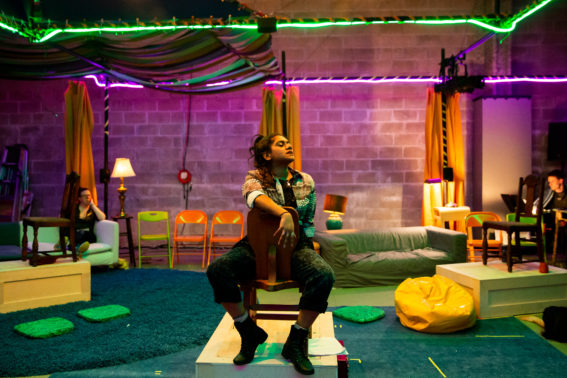********
What expectations did you have going into this process of working on ‘Marjana’?
I wasn’t entirely sure what to expect. For the longest time I was confused about what the show was going to be like, from the audition room until about a week ago actually (she laughs). But in rehearsals it was quite liberating to just create work physically and musically based on the topic and the stories of The One Thousand and One Nights we’ve chosen to share with our audiences. There was something liberating about not being restrained by prescribed words and stage directions.
Marjana is adapted from the tale of Ali Baba, but from the perspective of his house slave Marjana. Can you tell me what compels you most about the character of Marjana?
Marjana is a fearless girl / woman who goes through hell and back to add comfort to the lives of people around her. Marjana reminds me of the ‘Fearless Girl’ statue on Wall Street. Her demeanor is one that is charismatic, trustworthy, obedient YET strong. That’s a cocktail of words you don’t usually see when describing a female character. Marjana is the stencil for the opposite of woman-hood in silk road cultures. Growing up in Sri Lanka, to this day, I’ve witnessed how our societies have instilled a sense of femininity that is submissive as opposed to one where we are allowed to take control over our lives and actions. Marjana can be looked at as either a villain or a hero, it’s up to how you perceive the story, and women are often never allowed to take on either of the roles in a narrative– so Marjana breaks that barrier for us. It is very intriguing that this story has been around for hundreds of years, and was dictated by a male, yet we’ve lived through years of gender bias and stereotypes instilled by culture and societal standards.
What does this story mean to you? And how does this production fulfill you artistically?
Well I’m going to do my best to not throw any spoilers here, but I have to say that this show is much more than the ‘Ali Baba’ story. All of these stories can be used to discuss feminism. It is important that I iterate that feminism is in fact the idea of wanting equal opportunity for both parties : male and female. Neither of the gender parties stand superior, and neither of them display hatred towards the other. Branching under this topic, the story of Scheherazade and Shazaman is one that could be used to look at sexuality, abuse, and power. The story of Ali Baba can be used to look at greed, pride, and lust. There’s so many topics that these stories touch upon that I’m so glad we got to discuss in rehearsal and incorporate into the show. I’m a big advocate for using arts to explore issues of justice, and this process has been rewarding in that fact. Growing up my dad and my grandma would tell me stories of Kings who ruled before our time in Sri Lanka, and that was one way I obsessed over the rich culture that are rooted in me. I rarely heard any stories involving Queens or female heroes. My grandmother passed away very recently and so I’m dedicating MARJANA to her. The stories we tell our future generations will include strong female narratives as well.
What other design forms are incorporated into MARJANA? I was able to see a bit of rehearsal and know there’s dance and music!
We use movement and music. I’ve written music for shows before but this is actually the first time I’ve written music I’m truly proud of. We’ve been exploring environments and narrative plot points of the story through tableaus and movement snippets that we’ve incorporated into the show. A new design element I learned to embrace through this process is ‘silence’ and we’ve added that to the show too. We’ve allowed our bodies to carry the stories over to the audience. We’ve also allowed our bodies to take other life forms so I’m excited for the audience to see this. I had a professor tell me once, when there’s too many emotions than words can express, you sing it, and when there’s even more that song can’t express you allow dance to take over. Everyone on this creative team is so respectful and supportive of the space we all take in the room, and there’s nothing more beautiful than that.
MARJANA opens March 28 and runs to April 20… but what’s next for Isuri after MARJANA?
I’ll be going back to work at the non-profit Music & Memory, who’ve graciously allowed me to take a leave of absence so I can focus all my attention on this show. My visa will expire in July, but I’ll be back in the Fall to kick of Grad School at Yale School of Drama. I can’t believe I just typed that out.
********
Isuri Wijesundara is based in Sri Lanka and New York, USA. She is a 2018 Bachelor of Fine Arts graduate in Theatre with an acting concentration from Adelphi University. Isuri holds two Associate of Arts Diplomas from Trinity College London in Speech and Drama and Musical Theatre, in addition to a Classical Acting Semester Diploma after having trained at the London Academy of Music and Dramatic Arts. Isuri is a qualified Actor Combatant proficient in six disciplines of Stage Combat under the Society of American Fight Directors under guidance of Ray Rodriguez. Isuri has been a big fan of music since her baby days. She has qualifications in piano and violin performance under Trinity College London.
Photo by Gaia Squarci
